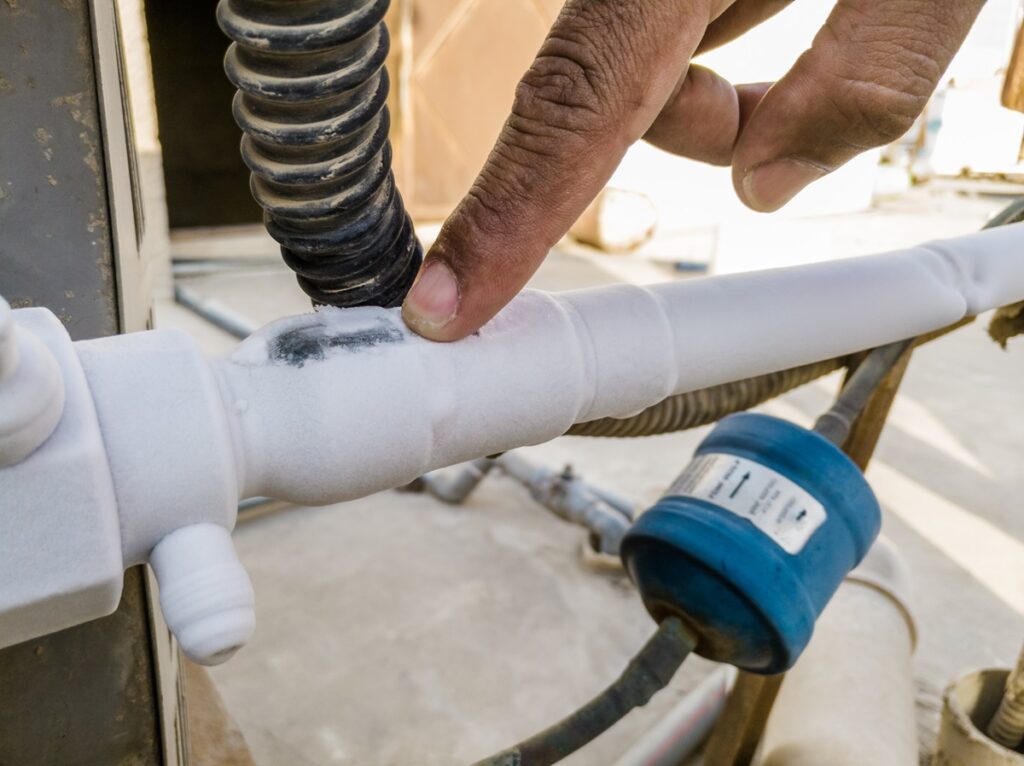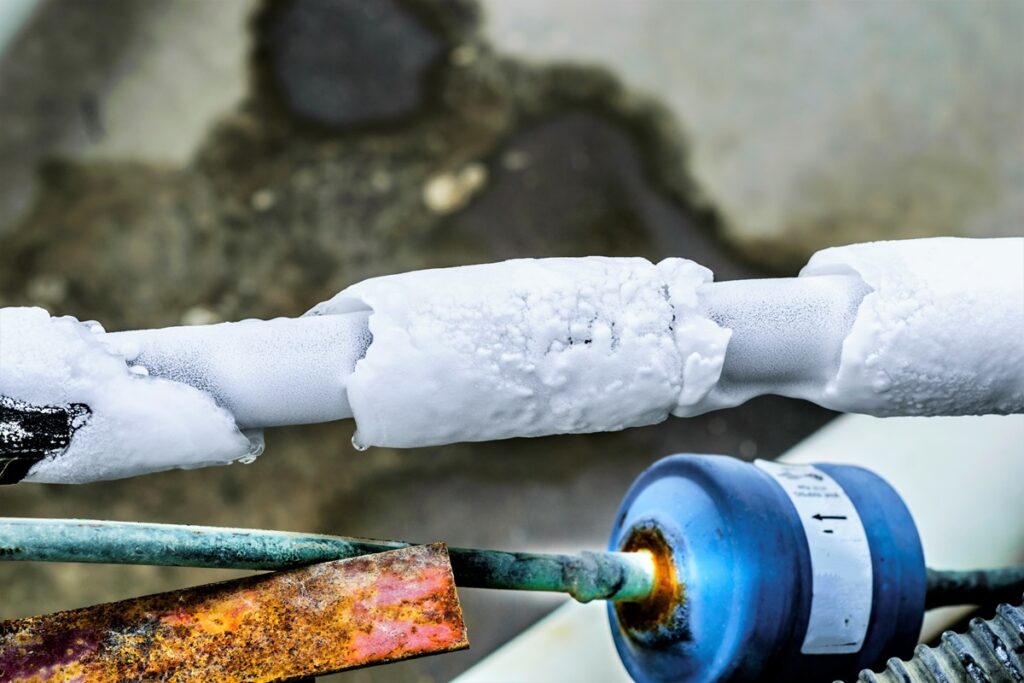Why Do Pipes Freeze on Air Conditioners?

When low temperatures hit, your heating is not the only thing that needs to be taken care of – although it might not be your first thought, making sure that your AC pipes don’t freeze is just as important. Otherwise, you might find yourself with a bigger problem during the next warm season.
Unfortunately, it happens more often than you might think. Why does it happen? And can you try to prevent it from happening? That’s what we’ll be focusing on in this article.
How Do Air Conditioner Pipes Freeze?
While a specific answer to “Why do pipes freeze on air conditioner?” might differ from case to case, there’s one main answer to the question that is usually the culprit behind it – and that is the evaporator coil being too cold.
Imagine this. When you turn on the AC, the air conditioner grabs the warm air from inside your home, cools it down and releases it back into your home. When the air conditioner cannot properly receive the warm air, the evaporator coils can become too cold, as they have no air to give away the cold, causing the copper lines that are part of your AC system to freeze.
Another common, although not as frequent reason for central air frozen pipe, is low refrigerant level. Once the levels become low, the temperature of the remaining liquid drops and the pressure decreases, which can eventually lead to freezing. Usually, this is caused by a leak – if you’ve been experiencing higher electrical bills or the air leaving your AC is warm instead of cold, chances are you’re experiencing a leak. In extreme cases, you might also be able to hear it.
But, going back to freezing caused by insufficient air – why wouldn’t the air reach all of the parts inside of your AC? Well, there could be several reasons.
Dirty Air Filter
The AC doesn’t only get rid of the warmth in the air, but it can also purify it from any debris, dust or other particles. Those can eventually clog the air filter, reducing the amount of air that can pass through it. This is why it is recommended that you change your AC filter monthly.
Damaged Blower Fan
The fan inside your AC is responsible for pulling the warm air into the unit and pushing the cooled-down air out. A damaged blower fan can result in reduced heat dissipation, which in turn can cause insufficient airflow and the coils become colder, causing moisture on them to freeze.
Damaged Air Duct
Usually caused by old age, physical impact by storing heavy items on top or rodents chewing through the ductwork, damaged AC ductwork can stop the flow of warm air into your conditioner, leading to decreased temperature and therefore frozen pipes.
Closed Supply Vents
Although it might seem like covering the vents in rooms that are not currently in use is a good idea to save on energy bills, the truth is slightly different. Doing so, limits how much air gets into the AC.
Warning Signs That Your AC Pipes Might Freeze
There is a number of signs you should look out for if you suspect that your AC pipes might be close to freezing, including:
- Reduced airflow: When your pipes are frozen, the airflow will be reduced due to the obstruction – you will notice that less cool air is coming out of your AC unit than it used to. That can be applicable either to the whole house, or only specific rooms – for example, your living room might be significantly colder than your bedroom. In extreme cases, the AC might also push down warm air instead of cooled-down air.
- Unusual noises: Your AC might start making weird noises, such as hissing, buzzing, etc.
- Visible ice: This is probably the most obvious sign of frozen AC pipes, but when it happens, you will notice ice on air conditioner pipe outside.
- Increased energy bills: Another very telling sign that there’s something wrong with your cooling system. As your AC pipes freeze, your air conditioning unit needs to work harder to provide the same results. Because of this, more energy is spent, which translates into higher energy bills.
How to Fix Frozen AC Lines

The best way to fix frozen air conditioner pipes will be dependent on what caused them to freeze in the first place. Either way, however, you need to thaw it to get rid of the ice. So, how does the whole process look? Here’s a step-by-step guide on how to fix frozen air conditioning pipes.
- Turn off the AC. Whatever you do, don’t do it with the AC on, as it can become a safety hazard – instead, turn it off and let it defrost. Keep in mind that it can take a few hours for the ice to disappear completely.
-
-
- It’s important to remember that thawing your AC can produce quite a lot of water, so it’s crucial to monitor its level so as to not cause moisture damage to your home.
-
- Check for the cause of the freezing and fix it. Once your air conditioner is off, you can examine it to see what has caused the freezing in the first place.
-
-
- If the cause was a dirty air filter, you will need to replace it with a new one.
- If the cause was a damaged blower fan, or damaged air duct, then you will have to replace the broken parts for new ones.
- If the cause were closed supply vents, you need to open them up. If they are blocked by furniture or fixtures, you will have to remove them.
- If the cause was a refrigerant leak, then you will need to fix it. For small leaks, you can use epoxy or solder. Bigger leaks are usually caused by a damaged part, so you might have to replace it. After the leak is fixed, you will have to add more refrigerant to increase the amount to healthy levels.
- If the cause is still undetected after closer examination, get in contact with HVAC technicians, as it might indicate that the issue goes deeper and requires professional repair.
-
- Don’t turn your AC back on until the issue has been resolved and the AC has been defrosted. Running your air conditioner unit while it’s frozen can further enhance the damage that caused it to freeze.
- Contact a professional in case of more serious issues. If you can’t figure out what caused your AC pipes to freeze or the issue doesn’t seem to be resolved even after multiple tries, get in touch with HVAC technicians – they’ll perform a comprehensive inspection of your unit to find the cause behind your AC pipes freezing. In case the damage turns out to be irreparable, they can also perform AC replacement once you find the unit you want to install in your home next.
How to Prevent Air Conditioner Pipes from Freezing
You might be thinking – “How do I stop my AC pipes from freezing?”. Well, the good news is that your AC pipes freezing is absolutely preventable. How?
By keeping your air filter clean at all times, checking the evaporator coils and ensuring that the refrigerant levels don’t fall below a certain level, among other things, you can minimize the chance of your AC pipes freezing again. However, the most important thing you can do in this regard is to have your AC professionally checked every once in a while.
Professional AC Maintenance
Air conditioners, just like all other machines, can break at some point – and while there’s no way to completely prevent it, there are some things that you can do to delay it from happening. One of those is calling for professional maintenance at least once a year.
Having your AC checked for common causes of frozen pipes can help you prevent it from happening – not to mention that during the AC tune-up, you might also discover issues that you otherwise wouldn’t have known about until it was too late.
The Bottom Line
Frozen air conditioner happens more often than you’d imagine, and usually the cause of it can be easily fixed by the homeowner. So, next time you see a frozen pipe on AC unit inside or outside, don’t go straight into panic mode – in most cases, you’ll be able to get rid of the culprit by yourself.
Sometimes, however, the issue is not as clear, or the damage is more severe than expected – in those cases, calling for professional help is inevitable, and having a reliable provider of air conditioner repair services you can call when something happens is essential.
Meadow Air has been exactly that for Arizonians for years now. Whether you require air conditioning repair or maintenance services or want to replace your AC for a new one, we’ve got you covered.
